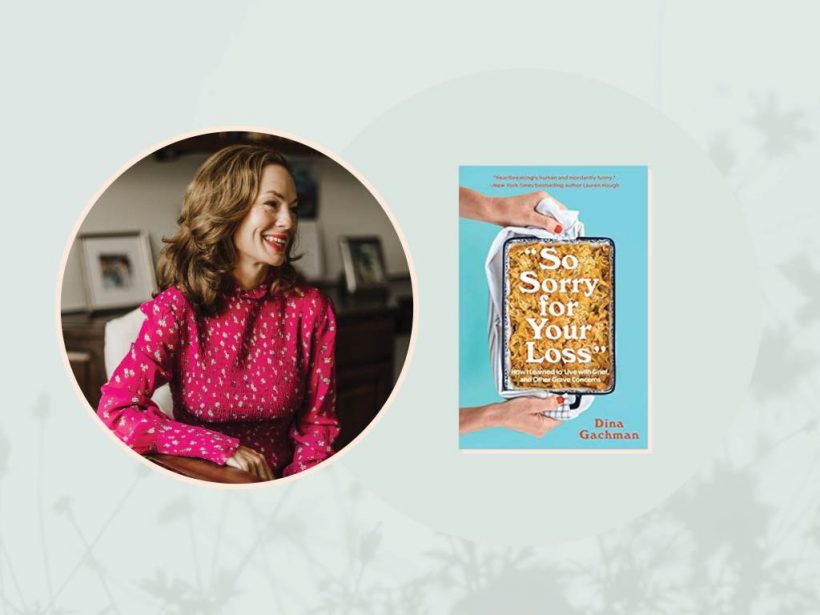
Losing a close family member is often a devastating experience, and it usually takes time to learn how to move forward in a positive way. But within three years of losing her mother to cancer, Dina Gachman’s sister died from an alcohol overdose, forcing her to go through the grieving process again in a short period of time.
“I wouldn’t wish it on anyone,” she says. “My mom was hard enough. When we got the call about my sister, it was very much a feeling of, I can’t believe this is happening again.”
But Gachman says she’s grown from the experience, and writing her new book, So Sorry for Your Loss: How I Learned to Live with Grief, and Other Grave Concerns, has helped her to process what she’s been through. Here’s what she experienced—and how she’s learned to move forward.
Gachman’s mom, Cindy, was diagnosed with stage 4 colon cancer in 2015. The diagnosis came just five weeks before Gachman’s wedding. “I was trying to figure out if I was even going to have the wedding after that,” Gachman says. But despite knowing the severity of cancer, Gachman says she “didn’t realize at the time that the diagnosis was not good.”
Her mother started chemotherapy, a treatment she was on fairly consistently for the next few years. Gachman lived in California at the time and her mother and father lived in Texas. “I got pregnant and couldn’t go to visit as much for a while,” she says. “My dad was the primary caregiver.”
However, Gachman went to Texas to help care for her mom after she entered hospice care. “Caregiving is so hard,” she says. “We had to do pretty much everything, including administering medications.” Gachman remembers how difficult it felt to do anything for herself during that time. “I remember thinking of going for a run and felt like I couldn’t fathom it,” she recalls.
Gachman’s mother died in 2018, the day before Gachman’s birthday. “It was painful,” Gachman says of losing her mom. She went back to work soon after, and was parenting a 13-month-old at the same time. “There is a lot of pressure on women and moms to keep it together and go back to work,” she says. “But about eight months later, I realized I needed help. I had a lot of anxiety.” She started therapy which she says was “a huge help” in allowing her to process her emotions around the loss.
Gachman’s sister Jackie struggled with addiction for years. Her experience with addiction to alcohol and other substances stretched back nearly two decades. “She had been in and out of rehab, and had been through detoxes,” says Gachman. “There were times we were scared to get ‘that’ call.”
Gachman says living with a loved one with addiction is “incredibly stressful” but she mistakenly thought her sister would recover after the first time she went to a rehab facility. “It became apparent that it was more than a phase,” she says. “It was really brutal for my parents, who tried everything and anything.” Gachman says she “didn’t understand alcoholism” at first and was frustrated that her sister wouldn’t just quit drinking. “It took me a long time to understand it,” she admits. Gachman eventually started attending Al-Anon meetings, which she says helped her to learn more about addiction and how to love someone with the disease.
Jackie had several relapses over the years, but she seemed to be doing well before her death. “The last year, she was doing amazing,” says Gachman. “But it was one slip. It was too much alcohol and her body basically shut down.”
When Jackie died in 2021, Gachman says “it felt totally unreal that we would be going through these motions again so soon.”

Union Square & Co.
Gachman had stopped going to therapy before her sister’s death, and she promptly started going again. “It’s very helpful and allows me to work on some of the anxiety and agitation that builds up,” she says. She says a therapist explained to her that, in grief, you don’t have a lot of mental space to deal with petty complaints — and that can lead to feelings of agitation. “That’s something I’ve grappled with, but I’ve learned to calm down.”
Gachman says the losses ultimately brought her family closer together. “We’ve had to learn to live with the grief in different ways,” she says. “My dad has his grief group; I have therapy. We’ve needed to find healthy outlets to live with it.”
She’s also connected through her book with other people who are grieving. “It’s very healing for me,” Gachman says. “It’s not that misery loves company, it’s understanding that you’re not alone. When you write about grief, everybody tells you about grief.”
Gachman says she’s learned to take space to care for herself on tough days, like when she knows she’ll need to talk about her mom and sister. “I try to remind myself to go on a walk and hang with the dog instead of grinding it out,” she says. “It’s OK to step away sometimes.”
Now, Gachman says she’s “much better than I was eight months after my mom died,” noting that she was very anxious and stressed during that time. “Wellbeing is an ongoing thing that I’ve made a priority in my life,” she says.
While Gachman stresses that she’s in a better place emotionally than she was immediately after her two losses, she still gives herself space to cry when thinking about her mom or sister. “I’ve really learned a lot about what it means to live with grief instead of trying to make it go away,” she says. “I have more joy than sadness, but I accept grief into my life.”

Source: Read Full Article

